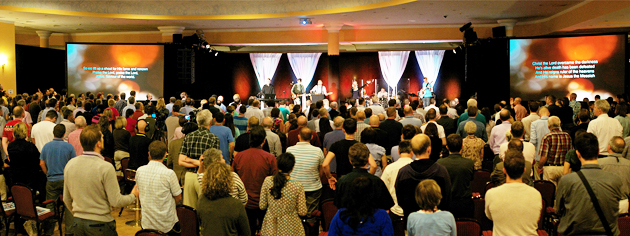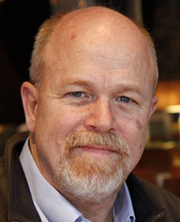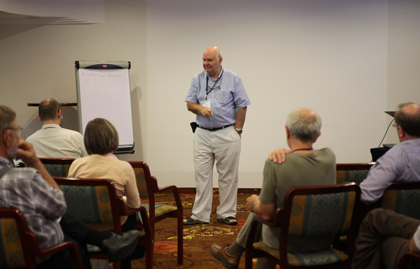Greg Pritchard talks about the exciting connections happening in Europe between evangelical leaders with a heart for God’s mission.
 A session of the 2014 ELF conference.
A session of the 2014 ELF conference.
The town of Wisla (in Poland) will host at the end of May one of the key gatherings of Christian leaders in the continent, the European Leadership Forum (ELF).
About 700 evangelical leaders from over 40 countries will come together to share experiences, get intensive training in their area of work and connect with other Christians with a similar vision.
More than 130 speakers will teach in a wide programme which offers 26 different thematic networks, such as Church Planting, Apologetics, Bible teaching, Science, Media Communications, Ministry to Muslims and Politics and Society.
The conference is led by a board of Christian leaders from different European countries. The vision is to “renew the biblical church and re-evangelise Europe” and this is why the yearly event is designed “to help leaders where they are.”
 Greg Pritchard.
Greg Pritchard. With the years, ELF has become a “coalition of evangelical Christian groups”, a platform which seeks to “provide a bridge between God’s global resources and local leaders from all over Europe.”
The days in Spring will help “identify, unite, mentor and resource evangelical leaders”, the organisation hopes.
Evangelical Focus interviewed Greg Pritchard, the director of ELF.
(AUDIO INTERVIEW AT THE BOTTOM OF THIS ARTICLE)
HOW DID THE CONFERENCE START?
Where did all start? “I brought the need to the president of the European Evangelical Alliance and said to him: ‘It seems there is a need for networks, groups of leaders who are focused on similar areas who work together’. And he said: ‘It is actually true but we don’t know how to do it, could you help us to develop some networks?’ And particularly he asked to work for Central and Eastern Europeans”, explains Greg Pritchard.
“So we started the conference, and we had Western Europeans which asked: ‘Can we come too?’ And the response was: ‘Yes you can come… as long as you lead it’.”
So a steering committee was created, a group which would help decide which networks would be started, what people were talking in the plenaries. “I’m only one member of 8 leaders in this committee”, stresses Pritchard.
The focus of ELF is Europe and the need to “re-evangelise” a continent which has become post-Christian. “To do this we work with leaders. We help them, come alongside, serve them, equip them, and resource them. That happens initially in the ELF conference, but then we have hundreds of events and strategies that spin-off out of the Forum every year.”
The idea is to unite people working in different areas but with the same vision. “In fact, all the leadership on the ground is from people who are already leading organizations, movements or churches… it is lead by people from all over Europe”, emphasizes Pritchard.
FOCL: “IDENTIFY CRITICAL LEADERHSIP NEEDS”
To coordinate all this connections and make all the conference logistics work, Pritchard leads a team which works for the Forum of Christian Leaders (FOCL), in Chicago (USA).
The heart of this team is “to equip, resource, Christian leaders… evangelical leaders. What we do in practical ways is to identify critical leadership needs, and try to find solutions to these needs.”
How does that happen in practice? “A good example is Evangelical Focus. This is a dream I talked to Pablo Martínez (Spain) about many years ago”, reminds Greg Pritchard.
“In conversations with you all we introduced you to a foundation which was interested in investing in what your vision and strategy was. So that is one of the ways, we come alongside leaders and ask them: ‘What is God calling you to do, and how can we help?’, and part of this might be that we introduce them to somebody.”
PUTTING PEOPLE IN CONTACT
“There are well over 350-400 strategies, initiatives, conferences, that happen out of the Forum each year, we are very grateful to the Lord. Most of these we do not have anything to do with. There are many, many examples…”, says Pritchard.
The ELF conference is FOCL’s biggest effort every year. One of the exciting facts is that “there are 400 leaders that are mentored each year. What we know is that equipped leaders can be really fruitful for the gospel of the Lord.”
 An interactive small-group session during the Forum.
An interactive small-group session during the Forum.Two new networks are being introduced in this edition. One is “a movement that in the last 20 years has been working with youth in Europe, but never had access to the other 25 countries.” It will be called “Youth Ministry movement leaders.”
The other one is for heads of Missionary organizations, “we have the International Director of Lausanne (Michael Oh) speaking in that network”.
But “the main thing I get excited –shares Pritchard- is to see the ongoing progress of what the Lord is doing. People are now leading national movements in their own countries”.
WHAT DOES IT MEAN TO BE AN ‘EVANGELICAL’?
The ELF is introduced as an initiative with a clear evangelical identity. But different Protestant churches and theologies in Europe would have their own definition of what ‘evangelical’ actually means. What is the ELF’s definition?
“You have to look at several places”, answers Pritchard. “One is biblically, the evangelical movement globally (not just in Europe) are those individuals who, basically, are born-again believers who believe the central truths, mentioned in Reformation. One of them is where the authority comes from. Authority is from the Scripture, not from the Church. And God has revealed his truth by that.”
Another key aspect is that “we know how we are saved… We are saved by faith alone, not through the sacraments of the Church. Those are the two major distinctions.”
 John Lennox leading one of the workshops.
John Lennox leading one of the workshops. And then there are many other ideas that flow from that. “The idea of born-again believers being all the members of the Church, you do not have members of the church who are not born-again. There is also a sense of common gospel, a sense of every member of the church being actively involved in ministry, everyone growing to maturity. There is much that comes from this robust evangelical view and it is basically equivalent of being a Protestant, an historical and orthodox Protestant.”
THE SO-CALLED ‘PROTESTANT LIBERALISM’
“We do really believe, we are not liberals”, adds the director of the ELF. “Liberals are a tradition in which people call themselves ‘Protestants’, but the original Protestants -Luther, Calvin-, they really believed in the gospel!”
“There are many individuals who claim the name of ‘Evangelical’, but in fact do not believe in justification by faith or do not believe the Bible as authoritative and true. And have moved away from a solid and robust evangelical position. But they often still would use the word, because they do not want to be labeled as liberals.”
“But if they have moved from an historic position of being an Evangelical, that is what they are. The accurate term is that they are Liberal Christians, people who affirm Christianity but have changed the definition”, concludes Pritchard.
“UNITY AROUND THE GOSPEL, FREEDOM IN SECONDARY ISSUES”
How does the ELF help define this clear evangelical identity in Europe? “What is wonderful of working together is that you are not alone”, argues the director of the conference.
“The Forum aims to being together Evangelicals who do believe.” This means that “Pablo Martínez from Spain can agree with Stefan Gustavsson, from Sweden, and all across the way we have 40 countries that are represented at the Forum. And it is very exciting when you have people like-minded, like-hearted, coming together. Groups do not need feel alone, because they are not. There is a sense robust of being like-minded and like-hearted, as Paul describes. And this is exactly what we are.”
And still there should be space for plurality in such a movement. “We don’t have to worry about the fuzzy lines that sometimes, because we have clarity in the gospel. We have freedom to recognise that some people are going to take some secondary positions on some issues. And we treat those secondary positions as secondary, they are not gospel issues.”
A MOVEMENT BIGGER THAN THE CONFERENCE
What about the moment in which the conference finishes? “People think of the event, but I try to describe that one week [the conference in Poland] as the tip of the iceberg. 90% of the iceberg is actually under the water, you are not able to see it.”
“Every day of the year on average there is something happening, somewhere, that is coming out of the Forum. Could be a speaking engagement, a conference, a seminar. Just in the last 24 hours I have heard that one of the national forums is doubling the numbers of the networks, it is an Hungarian forum, done in Hungarian language, all done and led by the Hungarians.”
“The ELF really is not an organization. Even the organization that I lead (the FOCL), we do not own the Forum, we are just one part of it, we are the ones who are organising, doing the administration, serving that way. But the European Leadership Forum is much bigger than what we are doing”, emphasises Pritchard.
One thing that shows this reality is that “all of the people who serve at it are volunteers. None of them are getting paid. Whether they are speakers or leading networks, they are donating their time to help others who are outside their organizations.”
WEBINARS AND HUNDREDS OF VIDEO RESOURCES
During the year, all the knowledge created by the ELF speakers can be accessed anytime on FOCL’s website.
“We have about 350 separate sessions at the Forum, and we record these resources at the conference. Some of those are several hours long, and all of those are captured on high definition video. They are then edited and made available.”
There are also hundreds of youtube-like videos with experts answering questions. “It is a growing database of resources so that anyone can access them. I looked to a question this morning which was two and half minutes answer. If someone has more time, it can be a twenty minutes talk or forty minutes. There are different levels of content depending on what your time is and what you are interested in.
The other resources offered are the online webinars. Almost every week there are several of them, “probably about 100 of them altogether in a year.”
Most are public: “Anyone can join, you can sign up, they are free, and you have access to some world-class speakers and leaders on important topics.”
It is “a chance to participate of the Forum without going to the annual meeting.” Pritchard gives an example: “We have a Cambridge University professor who did a workshop on Old Testament, on the concept of ‘genocide’. Seventy participated, we had people from all over the world, from every continent. We also had other professors listening in. You don’t get every day the chance to interact with a Cambridge professor on their speciality!”
LISTEN TO THE AUDIO INTERVIEW WITH GREG PRITCHARD:

Las opiniones vertidas por nuestros colaboradores se realizan a nivel personal, pudiendo coincidir o no con la postura de la dirección de Protestante Digital.
Si quieres comentar o